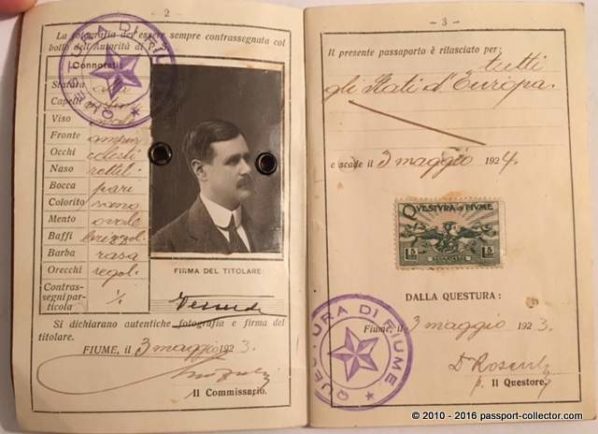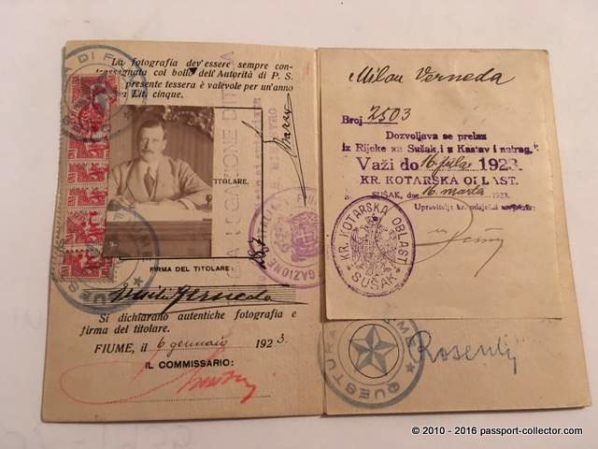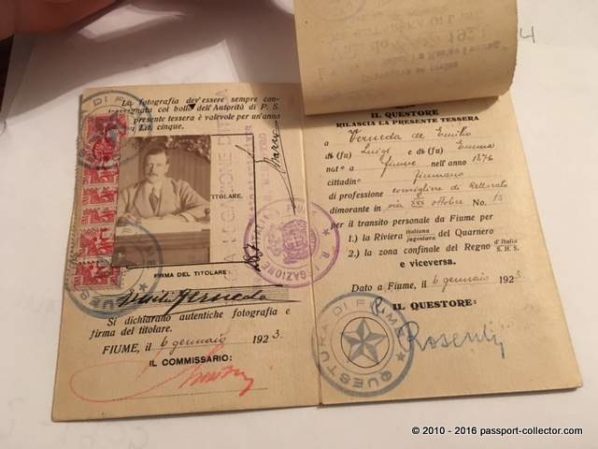Ever heard of a Fiume Passport?
Ever heard of a Fiume Passport?
As stated in another article earlier (see below) a FIUME passport is something pretty rare. I was recently offered one but the seller wanted way too much for it. I was ready to pay a fair price but his price suggestion was out of the discussion. However here are the pictures. Enjoy.






Fiume question, post-World War I controversy between Italy and Yugoslavia over the control of the Adriatic port of Fiume (known in Croatia as Rijeka; q.v.).
Although the secret Treaty of London (April 26, 1915) had assigned Fiume to Yugoslavia, the Italians claimed it at the Paris Peace Conference on the principle of self-determination. Ignoring the suburb of Susak, which had 11,000 Yugoslavs and 1,500 Italians, they claimed that the rest of Fiume had 22,488 Italians against 13,351 Yugoslavs and certain others. On Sept. 12. 1919, the Italian nationalist poet Gabriele D’Annunzio, who had mustered a body of men near Trieste, occupied Fiume and proclaimed himself the “commandant” of the “Reggenza Italiana del Carnaro.” The Italian government, however, on concluding the Treaty of Rapallo (Nov. 12, 1920) with Yugoslavia, resolved to turn D’Annunzio out of Fiume. Giovanni Giolitti, the Italian premier, ordered the battleship “Andrea Doria” to shell D’Annunzio’s palace only, predicting that the surprise would cause the “commandant” to escape at once—as indeed it did. Riccardo Zanella, the next premier, supported Count Carlo Sforza’s solution of the problem, namely a free state of Fiume-Rijeka with an Italo-Fiuman-Yugoslav consortium for the port; and such a solution was approved by the Fiuman electorate on April 24, 1921. But when the Fascists gained power in Italy, the Rapallo Plan for a free state came to nothing. Pressed by Benito Mussolini, the Yugoslav government yielded, and a new Italo-Yugoslav treaty, signed in Rome on Jan. 27, 1924, recognized Fiume itself as Italian while Susak became Yugoslav.
After World War II, by the Treaty of Paris (Feb. 10, 1947), all of Fiume became part of Yugoslavia.
Ever heard of a Fiume Passport?
FAQ Passport History
Passport collection, passport renewal, old passports for sale, vintage passport, emergency passport renewal, same day passport, passport application, pasaporte passeport паспорт 护照 パスポート جواز سفر पासपोर्ट
1. What are the earliest known examples of passports, and how have they evolved?
The word "passport" came up only in the mid 15th Century. Before that, such documents were safe conducts, recommendations or protection letters. On a practical aspect, the earliest passport I have seen was from the mid 16th Century. Read more...
2. Are there any notable historical figures or personalities whose passports are highly sought after by collectors?
Every collector is doing well to define his collection focus, and yes, there are collectors looking for Celebrity passports and travel documents of historical figures like Winston Churchill, Brothers Grimm, Johann Wolfgang von Goethe. Read more...
3. How did passport designs and security features change throughout different periods in history, and what impact did these changes have on forgery prevention?
"Passports" before the 18th Century had a pure functional character. Security features were, in the best case, a watermark and a wax seal. Forgery, back then, was not an issue like it is nowadays. Only from the 1980s on, security features became a thing. A state-of-the-art passport nowadays has dozens of security features - visible and invisible. Some are known only by the security document printer itself. Read more...
4. What are some of the rarest and most valuable historical passports that have ever been sold or auctioned?
Lou Gehrig, Victor Tsoi, Marilyn Monroe, James Joyce, and Albert Einstein when it comes to the most expensive ones. Read more...
5. How do diplomatic passports differ from regular passports, and what makes them significant to collectors?
Such documents were often held by officials in high ranks, like ambassadors, consuls or special envoys. Furthermore, these travel documents are often frequently traveled. Hence, they hold a tapestry of stamps or visas. Partly from unusual places.
6. Can you provide insights into the stories behind specific historical passports that offer unique insights into past travel and migration trends?
A passport tells the story of its bearer and these stories can be everything - surprising, sad, vivid. Isabella Bird and her travels (1831-1904) or Mary Kingsley, a fearless Lady explorer.
7. What role did passports play during significant historical events, such as wartime travel restrictions or international treaties?
During war, a passport could have been a matter of life or death. Especially, when we are looking into WWII and the Holocaust. And yes, during that time, passports and similar documents were often forged to escape and save lives. Example...
8. How has the emergence of digital passports and biometric identification impacted the world of passport collecting?
Current modern passports having now often a sparkling, flashy design. This has mainly two reasons. 1. Improved security and 2. Displaying a countries' heritage, icons, and important figures or achievements. I can fully understand that those modern documents are wanted, especially by younger collectors.
9. Are there any specialized collections of passports, such as those from a specific country, era, or distinguished individuals?
Yes, the University of Western Sidney Library has e.g. a passport collection of the former prime minister Hon Edward Gough Whitlam and his wife Margaret. They are all diplomatic passports and I had the pleasure to apprise them. I hold e.g. a collection of almost all types of the German Empire passports (only 2 types are still missing). Also, my East German passport collection is quite extensive with pretty rare passport types.
10. Where can passport collectors find reliable resources and reputable sellers to expand their collection and learn more about passport history?
A good start is eBay, Delcampe, flea markets, garage or estate sales. The more significant travel documents you probably find at the classic auction houses. Sometimes I also offer documents from my archive/collection. See offers... As you are already here, you surely found a great source on the topic 😉
Other great sources are: Scottish Passports, The Nansen passport, The secret lives of diplomatic couriers
11. Is vintage passport collecting legal? What are the regulations and considerations collectors should know when acquiring historical passports?
First, it's important to stress that each country has its own laws when it comes to passports. Collecting old vintage passports for historical or educational reasons is safe and legal, or at least tolerated. More details on the legal aspects are here...
Does this article spark your curiosity about passport collecting and the history of passports? With this valuable information, you have a good basis to start your own passport collection.
Question? Contact me...

